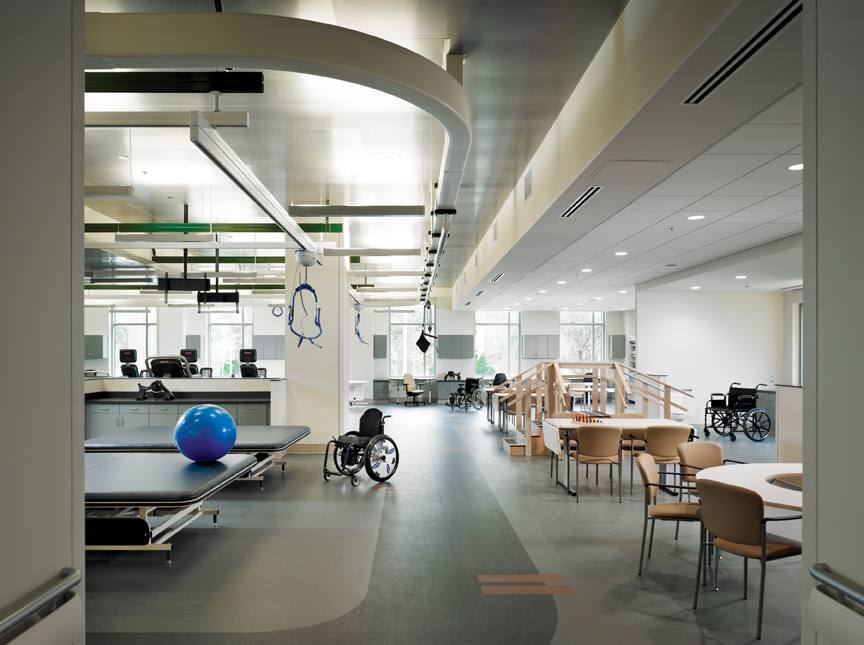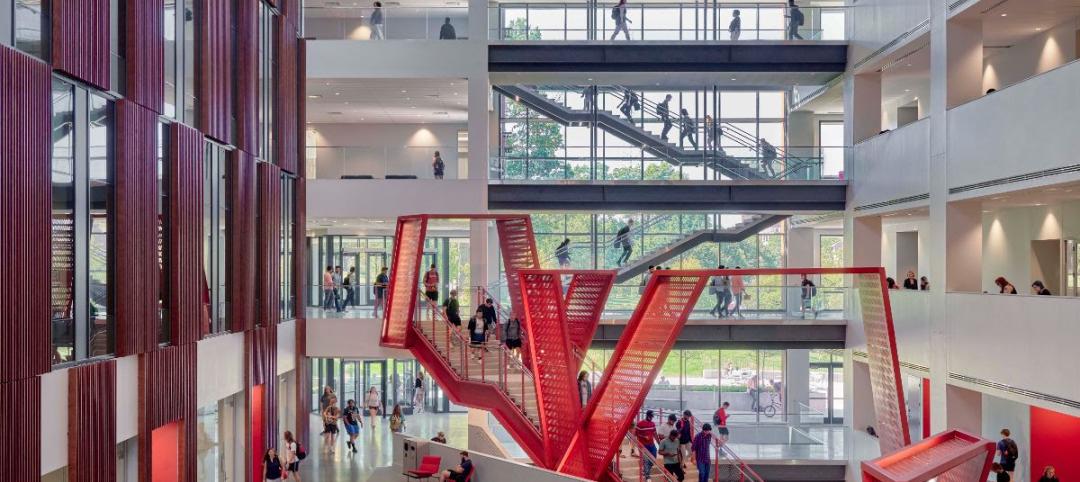2012 Building Team Awards
Gold Award
Since the early 2000s, the U.S. Department of Veterans Affairs has treated more than 200,000 Iraq- and Afghanistan-war veterans for post-traumatic stress disorder. The rate of traumatic brain injury (TBI) among U.S. forces has risen dramatically in the last decade as well, from 10,963 cases in all of 2000 to 30,380 just in the fourth quarter of 2011.
Audie L. Murphy VA Hospital in San Antonio, Texas, named after the most decorated soldier of World War II, provides a place for this dramatically increasing number of wounded veterans to receive care. The Building Team—prime contractor Robins & Morton and joint venture design firms SmithGroupJJR and Marmon Mok—faced complicated site logistics and security restrictions, but still managed to come in under budget and produce a facility that meets the physical and psychological needs of the veterans it serves.
This hospital was the VA’s first project constructed under the so-called “Integrated Design and Construct” method, which teams the contractor with the architect and owner early in the construction process. The Building Team credits this collaboration with the facility’s month-early completion and $3.75 million cost savings. Although the project was not required to be LEED-certified, the team still implemented high-level sustainability.
At the project’s core were the hospital’s patients: veterans recuperating from multiple traumatic injuries, often including limb loss and TBI. The “Planetree” principle—which seeks to create a healing environment inspired by nature—was employed throughout the facility’s design.
Because many TBI patients are extremely sensitive to light and noise, the Building Team used indirect and accent lighting and equipped each bed with controls so every patient can individually adjust the levels. All windows diffuse natural light and are equipped with blackout shades. Working with acoustic noise consultants, the team used low-pressure diffusers and air ducts to minimize the sound of air rushing through the HVAC system.
The Building Team went beyond standard ADA requirements and handicap-accessibility considerations to incorporate tools that help patients rehabilitate. The facility’s physical therapy gymnasium is used to work on remobilization in everyday scenarios, such as getting around the kitchen and bathroom and walking up and down stairs. Tracks for patient lift systems run along the ceilings throughout the facility to allow patients to walk while tethered, improving their balance, strength, and autonomy.
The GAIT Study room features a high-tech flooring system that measures the pressure points and angles with which a patient walks, runs, and jumps to assess whether correction is needed. The VA was also able to use a portion of the project’s $3.75 million cost savings to install a terrain park in the building’s center courtyard that functions as a physical therapy tool, with pull-up bars, steps, and paths of different surfaces.
“It’s one thing to say that you saved money, but to get a clear amenity out of it is a sign of a great Building Team,” said Tim Brown, AIA, of Tim Brown Architecture and associate professor at IIT’s College of Architecture, Chicago.
Hurdles posed by site logistics were handled quickly and efficiently. The laydown area and construction-employee parking lot were a full mile from the job site, requiring bussing workers to and from every day and night. Only one delivery truck could be on site at a time and every piece of material had to be scheduled in advance.
Project summary
GOLD AWARD
Audie L. Murphy VA Polytrauma Rehabilitation Center
San Antonio, TexasBuilding Team
Submitting entity: Robins & Morton (prime contractor)
Owner/developer: U.S. Department of Veterans Affairs
Architect: SmithGroupJJR | Marmon Mok Joint VentureGeneral Information
Project size: 84,000 sf
Construction cost: $39.5 million
Construction time: August 2009 to July 2011
Delivery method: Integrated design and construct
Phase one of the project included some work underneath the hospital’s existing parking lot, which meant that, for six weeks, Robins & Morton had to schedule work during nights and weekends to eliminate disruption to the hospital campus. Moreover, when the team tried to tie in the existing hospital to the new facility, it discovered that the 40-year-old building’s precast was falling down. The contractor had to remediate this problem while making sure that the new structure didn’t look like an add-on.
The Building Team’s commitment to veterans was paramount throughout the project. When, arguably for security reasons, the VA wanted to put up an Internet firewall, the team, knowing how important access to social media via laptops and mobile devices is to the new generation of veterans, fought for and got access to the Web for patients.
Robins & Morton also exceeded its goals for construction subcontracts granted to small veteran-owned businesses, awarding 17% to them. It also granted 10% to service-disabled veteran-owned small businesses, 6% to small disadvantaged businesses, 5% to women-owned small businesses, 41% to small business enterprises and 21% to HubZone small business.
Building Team Awards judge Terry Fielden, LEED AP BD+C, director of K-12 Education at International Contractors Inc., said he was impressed with the way the design came to fruition: “There was a lot of collaboration, especially with the veterans’ needs in mind.” BD+C
--
Click here to view exclusive video interviews of the 2012 Building Team Awards judges explaining their selection.
Related Stories
University Buildings | Dec 5, 2023
The University of Cincinnati builds its largest classroom building to serve its largest college
The University of Cincinnati’s recently completed Clifton Court Hall unifies the school’s social science programs into a multidisciplinary research and education facility. The 185,400-sf structure is the university’s largest classroom building, serving its largest college, the College of Arts and Sciences.
MFPRO+ News | Dec 5, 2023
DOE's Zero Energy Ready Home Multifamily Version 2 released
The U.S. Department of Energy has released Zero Energy Ready Home Multifamily Version 2. The latest version of the certification program increases energy efficiency and performance levels, adds electric readiness, and makes compliance pathways and the certification process more consistent with the ENERGY STAR Multifamily New Construction (ESMFNC) program.
Architects | Dec 5, 2023
Populous celebrates its 40th anniversary with a photo exhibit of its works
The firm partnered with Getty Images to assemble more than 60 images, many capturing fan ardor.
Office Buildings | Dec 1, 2023
Amazon office building doubles as emergency housing for Seattle families
The unusual location for services of this kind serves over 300 people per day. Mary's Place spreads across eight of the office's floors—all designed by Graphite—testing the status quo for its experimental approach to homelessness support.
Mixed-Use | Nov 29, 2023
Mixed-use community benefits from city amenities and ‘micro units’
Salt Lake City, Utah, is home to a new mixed-use residential community that benefits from transit-oriented zoning and cleverly designed multifamily units.
Giants 400 | Nov 28, 2023
Top 100 Laboratory Design Firms for 2023
HDR, Flad Architects, DGA, Elkus Manfredi Architects, and Gensler top BD+C's ranking of the nation's largest laboratory architecture and architecture/engineering (AE) firms for 2023, as reported in Building Design+Construction's 2023 Giants 400 Report.
Engineers | Nov 27, 2023
Kimley-Horn eliminates the guesswork of electric vehicle charger site selection
Private businesses and governments can now choose their new electric vehicle (EV) charger locations with data-driven precision. Kimley-Horn, the national engineering, planning, and design consulting firm, today launched TREDLite EV, a cloud-based tool that helps organizations develop and optimize their EV charger deployment strategies based on the organization’s unique priorities.
Market Data | Nov 27, 2023
Number of employees returning to the office varies significantly by city
While the return-to-the-office trend is felt across the country, the percentage of employees moving back to their offices varies significantly according to geography, according to Eptura’s Q3 Workplace Index.
Resiliency | Nov 27, 2023
All levels of government need to act to cope with climate-driven flooding and sea level rise
The latest National Climate Assessment highlights the need for local, state, and federal governments to adopt policies to mitigate the effects of climate-driven flooding and sea level rise, according to a policy expert with the National Resources Defense Council.
Data Centers | Nov 22, 2023
How is artificial intelligence impacting data center design?
As AI is reshaping how we interact with machines and the world around us, the design of data centers needs to adapt to this fast-changing landscape. So, Page pairs expert thinking with high-performing solutions to meet the needs of rapidly advancing technologies.

















